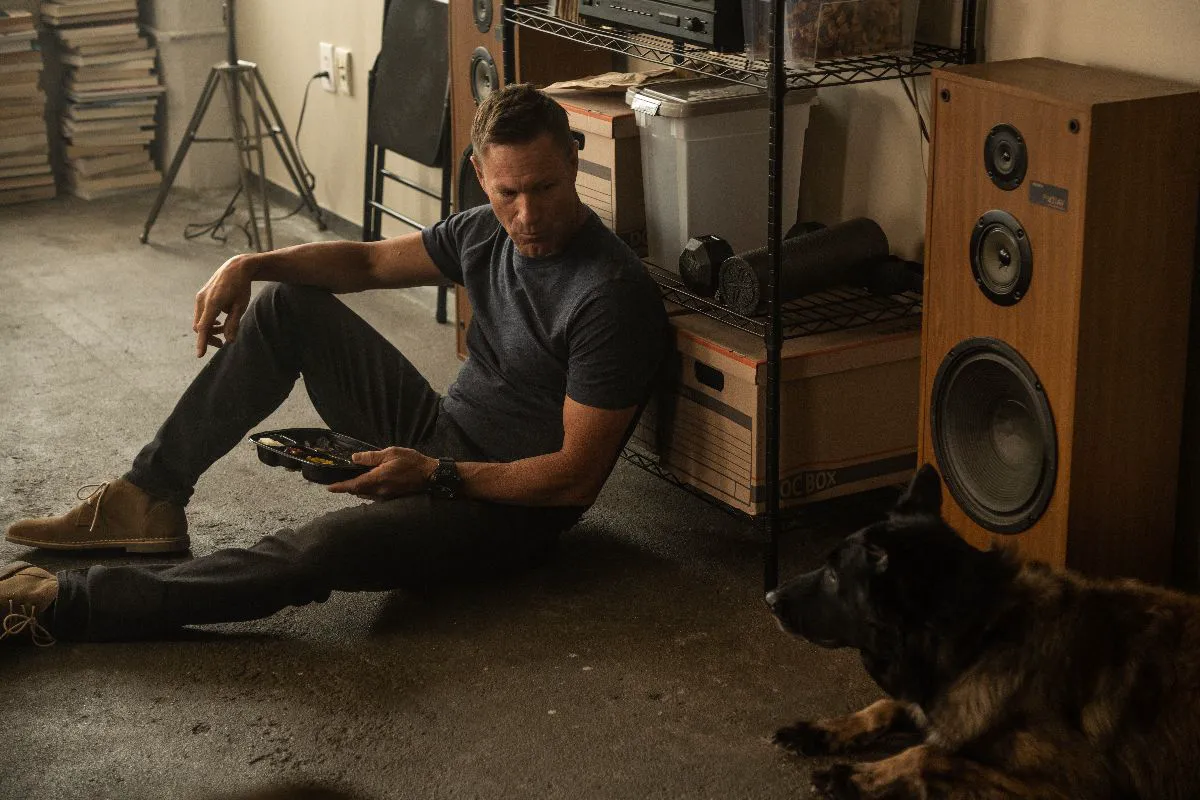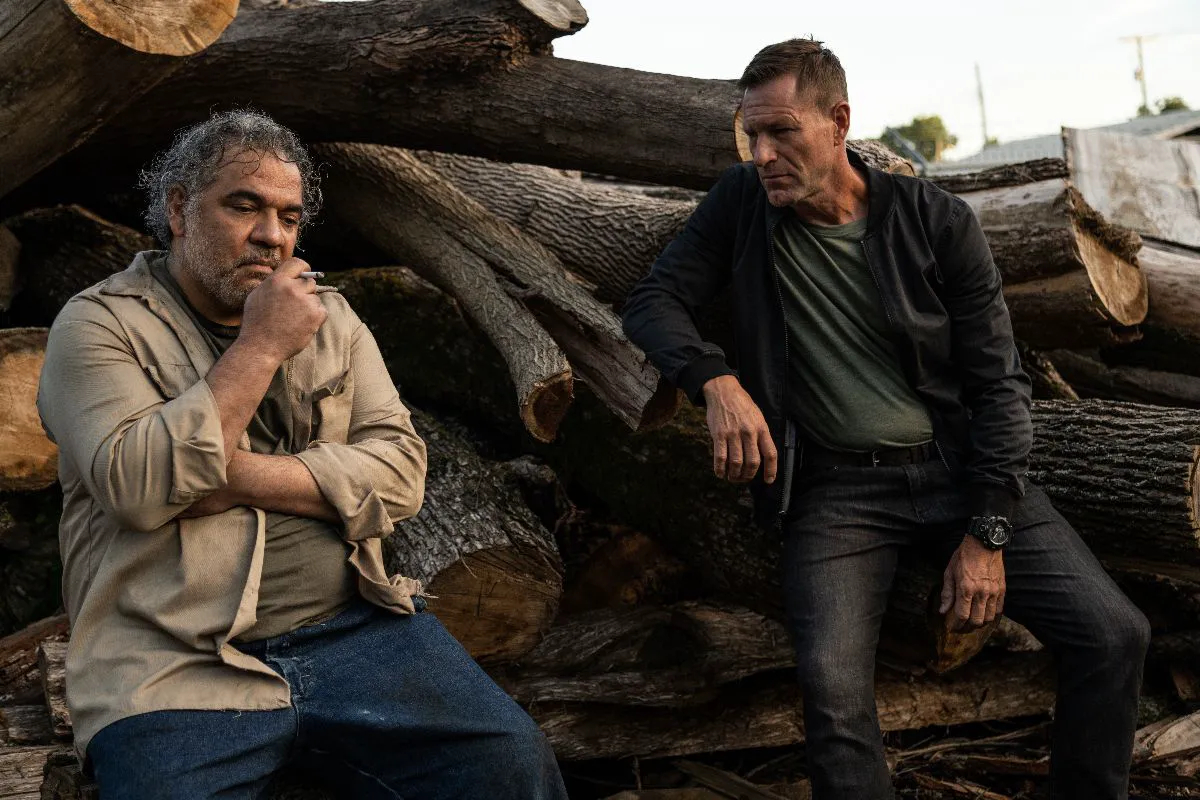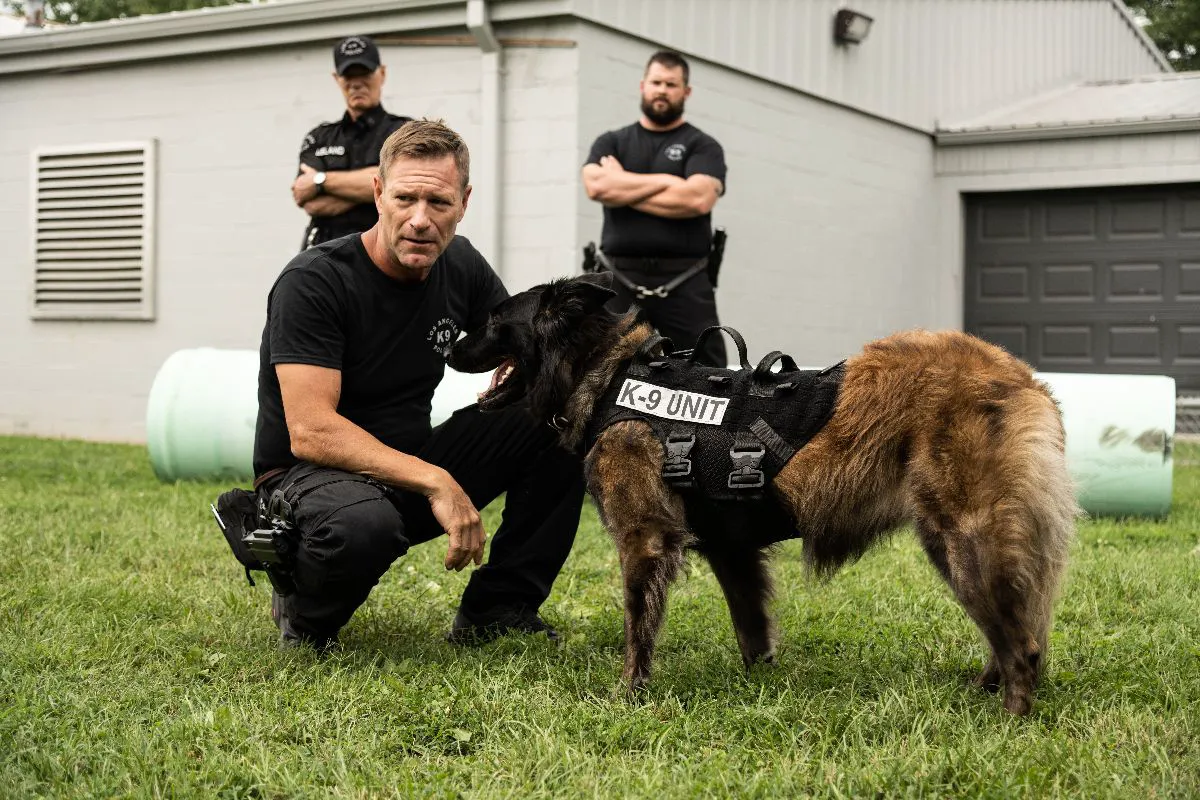Jack Rosser (Aaron Eckhart) is an Iraq War veteran. After undergoing treatment for PTSD, he finds work as a K9 officer in the police force. His only friend becomes his police dog, with whom he communicates as if it were human. But one day, during an assignment, an unknown assailant kills the dog. The police leadership is unwilling to investigate the dog’s death, as they have other pressing matters. Rosser then embarks on his own quest for justice, gradually unraveling a criminal web.

Aaron Eckhart as Jake in a still from “Muzzle”
From Comedy to Crime Drama: A Shift in Tone
Films about the relationship between police officers and dogs have often been shot in a comedic vein, reminiscent of “K-9” or “Turner & Hooch.” Directors didn’t shy away from irony, narrating the difficulties in communication between humans and animals, only to bring the audience to tears of emotion with touching scenes of devoted friendship in the finale. John Stalberg also started with comedies (“High School”), but in his new work, “Muzzle,” there is no humor at all. The protagonist, Jack Rosser, has been through a brutal war, the memories of which periodically torment him. He shares war stories with his partner, a police dog, with whom he lives and is almost always inseparable. Rosser finds it difficult to communicate with people. Even with colleagues, he exchanges short phrases, and he curtly cuts off attempts by a young neighbor to strike up a conversation.
Eckhart’s Performance: A Study in Post-Traumatic Stress
Almost the entire film rests on Aaron Eckhart’s performance. The actor has often starred in action films, where he easily dispatches hordes of enemies. However, his character, Rosser, is not a role model at all. He is a man who is struggling with post-war syndrome. He sees enemies everywhere, and the bustling streets of the city are reminiscent of heavy battles under the scorching sun. He doesn’t trust people because he knows they can deceive. And only a dog will never abandon you in trouble, because it is devoted to its owner. Jack Rosser reciprocated his friend and even attacked a paramedic in front of reporters when he refused to immediately provide first aid to the dying animal.

Aaron Eckhart as Jake in a still from “Muzzle”
Beyond Revenge: A Different Kind of Justice
Despite the plot similarity to “John Wick” (in the first part, the abduction of Wick’s car and the killing of his dog served as the setup), the action of “Muzzle” unfolds in a completely different way. Action scenes are minimized. Jack Rosser does not become a lone avenger at all. On the contrary, he continues to serve in the police, gets a new dog, and only investigates the death of his partner in his free time.
Character Evolution: From Animal to Human
Golden Globe nominee Aaron Eckhart perfectly showed the development of the main character. At the beginning of the film, he is an aggressive, alienated man whose consciousness has remained on the battlefield. He doesn’t like people and prefers to communicate exclusively with his dog. Figuratively speaking, the protagonist evolves from animal to human throughout the film. Thanks to the romantic feeling that was born in his soul, Rosser overcomes cruelty and indifference — the terrible psychological consequences of the war. In a conversation with a psychoanalyst, he says that the war deprived him of faith in people, because he saw that there is nothing that a person is so skilled at as killing his own kind.

Aaron Eckhart as Jake in a still from “Muzzle”
Themes and Metaphors: War, Trauma, and Redemption
The anti-war pathos of the film is combined with a deep study of the image of the protagonist and a criminal plot. To reinforce the metaphor of a man-beast, the director introduces a problematic dog, Rosser’s new partner, into the narrative. The dog highlights all the psychological difficulties of Eckhart’s character: he is aggressive and does not trust people, as he has experienced abuse from his previous owner. In addition, the dog begins to be jealous of Rosser for his new girlfriend, thinking that the owner no longer loves her and will soon throw her away, like the previous owner.
A Blend of Genres: Crime, Drama, and Social Commentary
Perhaps the elements of psychological drama slightly mix the main storyline with the investigation into the murder of Rosser’s partner. The awakened human beginning forces the protagonist to declare an uncompromising war on drug dealers who, taking advantage of people’s poverty and despair, involve lost young people in their criminal networks. Rosser’s confrontation with the drug cartel gradually begins to resemble the confrontation between Vietnam War veteran Travis Bickle and New York gangsters.
Echoes of “Taxi Driver”: A City as Hell
The analogy with “Taxi Driver” is reinforced by the image of the city. As in Scorsese’s film, the city in “Muzzle” is hell on earth. The poor huddle in slums, where garbage is scattered everywhere, and the police prefer to appear less often in depressed areas, because an armed criminal can be hiding literally around every corner.
Conclusion: A Psychological Drama of Rebirth
John Stalberg’s film is not so much a familiar action movie about revenge as a psychological drama about how a war veteran who has lost the meaning of life, living like a beast, only by instincts, gradually resurrects, learns to love and care for someone other than a dog. The noble goal of ending crime, at least in a single area, gives meaning to Jack Rosser’s existence, helps him direct his rage to fight evil, and thus atone for his guilt to his colleagues who did not return from the Iraqi fields.